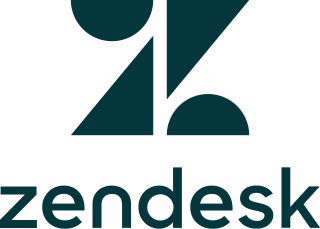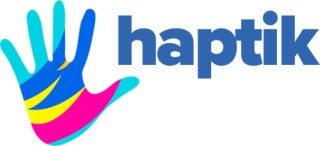ICQ was a cross-platform instant messaging (IM) and VoIP client founded in June 1996 by Yair Goldfinger, Sefi Vigiser, Amnon Amir, Arik Vardi, and Arik's father, Yossi Vardi. The name ICQ derives from the English phrase "I Seek You". Originally developed by the Israeli company Mirabilis in 1996, the client was bought by AOL in 1998, and then by Mail.Ru Group in 2010.

A chatbot is a software application or web interface that is designed to mimic human conversation through text or voice interactions. Modern chatbots are typically online and use generative artificial intelligence systems that are capable of maintaining a conversation with a user in natural language and simulating the way a human would behave as a conversational partner. Such chatbots often use deep learning and natural language processing, but simpler chatbots have existed for decades.

Customer service is the assistance and advice provided by a company through phone, online chat, mail, and e-mail to those who buy or use its products or services. Each industry requires different levels of customer service, but towards the end, the idea of a well-performed service is that of increasing revenues. The perception of success of the customer service interactions is dependent on employees "who can adjust themselves to the personality of the customer". Customer service is often practiced in a way that reflects the strategies and values of a firm. Good quality customer service is usually measured through customer retention.

NICE Ltd. is an Israeli technology company specializing in customer relations management software, artificial intelligence, and digital and workforce engagement management. The company serves various industries, such as financial services, telecommunications, healthcare, outsourcers, retail, media, travel, service providers, and utilities.

Oracle RightNow is an American customer relationship management (CRM) software service for enterprise organizations which is part of Oracle Service. It was originally developed by RightNow Technologies, Inc., which was acquired by Oracle Corporation in 2011 in a $1.8 billion deal.
Traction TeamPage is a proprietary enterprise 2.0 social software product developed by Traction Software Inc. of Providence, Rhode Island.

Impulse was a digital distribution and multiplayer platform. Originally developed by Stardock to succeed Stardock Central, it was purchased by GameStop in March 2011, and was subsequently rebranded as GameStop PC Downloads, with the client being renamed GameStop App. The client was discontinued in April 2014.
Flipkart Private Limited is an Indian e-commerce company, headquartered in Bangalore, and incorporated in Singapore as a private limited company. The company initially focused on online book sales before expanding into other product categories such as consumer electronics, fashion, home essentials, groceries, and lifestyle products.
LiveChat is an online customer service software with online chat, help desk software, and web analytics capabilities.

Zendesk, Inc. is an American company headquartered in San Francisco, California. It provides software-as-a-service products related to customer support, sales, and other customer communications. The company was founded in Copenhagen, Denmark, in 2007. Zendesk raised about $86 million in venture capital investments before going public in 2014.
Help Scout, legally Help Scout PBC, is a global remote company headquartered in Boston, Massachusetts, specializing in help desk software. The company provides an email-based customer support platform, a knowledge base tool, and an embeddable search/contact widget for customer service professionals. Help Scout's primary product is a web-based SaaS help desk that complies with HIPAA regulations.

Kriti Sharma is an artificial intelligence technologist, business executive and humanitarian. As of 2018, she is the vice president of artificial intelligence and ethics at UK software company Sage Group. Sharma is the founder of AI for Good UK, which works to make artificial intelligence tools more ethical and equitable. Sharma has been named to Forbes magazine's 30 Under 30 Europe: Technology list, and appointed as a United Nations Young Leader. In 2018, she was appointed as an advisor to the UK's Department for Digital, Culture, Media and Sport. Sharma's initiatives include Pegg, an accounting chatbot, and rAInbow, a platform to support survivors of domestic violence. She has called for a philosophy of "embracing botness", arguing that artificial intelligence should prioritize utility over human resemblance.

Haptik is an Indian enterprise conversational AI platform founded in August 2013, and acquired by Reliance Industries Limited in 2019. The company develops technology to enable enterprises to build conversational AI systems that allow users to converse with applications and electronic devices in free-format, natural language, using speech or text. The company has been accorded numerous accolades including the Frost & Sullivan Award, NASSCOM's Al Game Changer Award, and serves Fortune 500 brands globally in industries such as financial, insurance, healthcare, technology and communications.
Conversational commerce is e-commerce done via various means of conversation and using technology such as: speech recognition, speaker recognition, natural language processing and artificial intelligence.
Conversable is a SaaS based Artificial Intelligence (AI) powered conversational platform, headquartered in Austin, Texas. It allows customers to create intelligent, automated response flows through conversations in any messaging channel or voice platforms. It has offices in Austin and Dallas.
Netguru is a Polish software development and software consultancy company founded in 2008. Headquartered in Poznań, Poland, it's a globally operating business, with local offices including Warsaw, Kraków, Wrocław, Gdańsk and Białystok. It provides software design and product design, both for early-stage startups and corporations.

Prosus N.V., or Prosus, is a global investment group that invests and operates across sectors and markets with long-term growth potential. It is among the largest technology investors in the world.
A software bot is a type of software agent in the service of software project management and software engineering. A software bot has an identity and potentially personified aspects in order to serve their stakeholders. Software bots often compose software services and provide an alternative user interface, which is sometimes, but not necessarily conversational.
ChatBot is a software platform for creating chatbots for business use released in August 2017.

Yellow.ai, formerly Yellow Messenger, is a multinational company headquartered in San Mateo, California focused on customer service automation. It was founded in 2016 and provides an AI platform for automating customer support experiences across chat and voice. The platform supports more than 135 languages across more than 35 channels.











